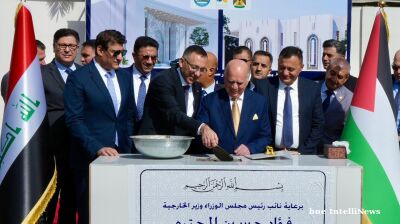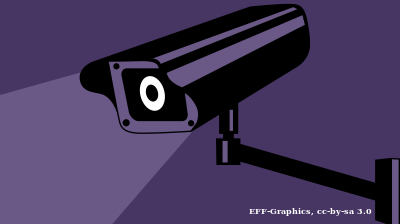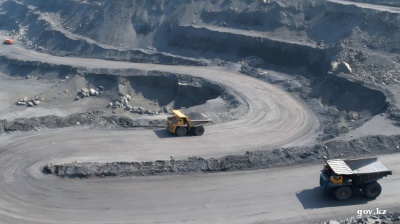Describing Kazakhstan's Nursultan Nazarbayev as an "aged president", Kyrgyzstan's outgoing President Almazbek Atambayev again criticised his Kazakh counterpart on November 15 as he commented on the ongoing border dispute between their two countries. He added that he would not apologise to the 77-year-old head of state whom he said was penalising Bishkek on a “whim”.
Kazakhstan tightened its Kyrgyz border controls following accusations that Astana tried to meddle in Kyrgyzstan’s presidential election. The restrictions have supposedly almost halved the flow of trade between the two countries. Kazakh border guards have been singling out Kyrgyz consignments for inspections since October 10.
On October 24, Kyrgyzstan announced it would be cancelling $100mn in grant aid it had agreed to receive from Kazakhstan. The IMF said it expected the dispute to affect Kyrgyzstan’s GDP growth, noting it might only reach 3.2%-3.3% this year, below the originally expected 3.5%.
The border dispute links back to 61-year-old Atambayev publicly accusing Kazakhstan of openly supporting ex-prime minister Omurbek Babanov in the race for the presidency. Nazarbayev met with Babanov in Astana on September 19 and Atambayev's administration subsequently accused Kazakhstan as portraying the encounter as a meeting of equals. Babanov subsequently lost the election and Atambayev apologised for his remarks, though it appears Atambayev has not been able to refrain from throwing some more criticisms Nazarbayev’s way before he steps down to make way for his successor Sooranbai Jeenbekov.
"[Kyrgyzstan] has been cut off from the Eurasian Economic Union at the whim of Kazakhstan's leadership," Atambayev remarked on November 15. Both countries are members of the Eurasian Economic Union (EEU), a Russia-led trade bloc, which also includes Belarus and Armenia.
"Some people seem to say that Atambayev must bend his knee in front of the rich neighbour and apologise... It is not Atambayev but those who impertinently meddle in our affairs who must apologise; those who wanted to put their flunky [Babanov] on the chair of the sovereign Kyrgyzstan president," Atambayev added. "Yes, their flunky will sit. However, not on the presidential chair but in a prison cell."
The Kyrgyz Prosecutor-General's Office announced on November 4 that it had opened a criminal case against Babanov and other unidentified individuals of "stoking ethnic, racial, and religious hatred" and "publicly calling for the violent change of the constitutional order". He has since stepped down as leader of the Respublika-Ata-Jurt parliamentary faction.
Kyrgyzstan joined the EEU in August 2015 with the hope of securing ease of access for its agricultural products, among other goods, to Kazakhstan and Russia. Kazakhstan has since been making Kyrgyzstan’s participation difficult by demanding that Kyrgyzstan meet sanitary standards of the EEU. Moreover, the bloc has hit Kyrgyzstan’s re-export market—especially, the used car market and the Dordoi bazaar, which served as a conduit for cheap Chinese goods flowing into Russia and the rest of Central Asia.
"In spring 2014, at the whim of a similar aged dictator in another neighbouring republic, our southern regions were cut off from natural gas. I remember how our political wirepullers, our lawmakers shouted then saying that Atambayev must go and bend to the aged dictator," Atambayev added, referring to the late Uzbek autocrat Islam Karimov’s decision in 2014 to cut off gas supplies to Kyrgyzstan. Uzbekistan mended its ties with Kyrgyzstan after Karimov died in 2016 and reform-minded Uzbek President Shavkat Mirziyoyev came to power. Nonetheless, Atambayev’s statements may not be wise, considering he is now leaving his successor with an angry neighbour to deal with.
Mirziyoyev has been attempting to foster regional cooperation in Central Asia as his predecessor’s cautious approach had kept barriers to economic partnership tightly in place.
News

Bill Gates makes surprise Indian TV debut
In a move set to spark both intrigue and curiosity, Microsoft co-founder and philanthropist Bill Gates has made a cameo appearance on Indian television, entering the iconic drama series Kyunki Saas Bhi Kabhi Bahu Thi 2.

Queen Sirikit of Thailand dies
The death of Queen Sirikit of Thailand has marked the end of an era for the Thai monarchy. According to an official statement from the Bureau of the Royal Household of Thailand, Her Majesty died at 9.21 pm on October 24.

Pakistan, the latest in Asia to see gold prices plummet
In international trading, the precious metal lost $35 per ounce to settle around $4,115, extending a week-long slide triggered by shifting expectations over US monetary policy.
_1761305900.jpg)
Latin America edges up growth forecasts but remains trapped in low gear, ECLAC says
Latin America and the Caribbean will expand 2.4% this year, the Economic Commission for Latin America and the Caribbean said, marking the second upward revision since April but pointing to the region's struggle to escape chronically weak growth.

_02 Cropped_0.jpg)


